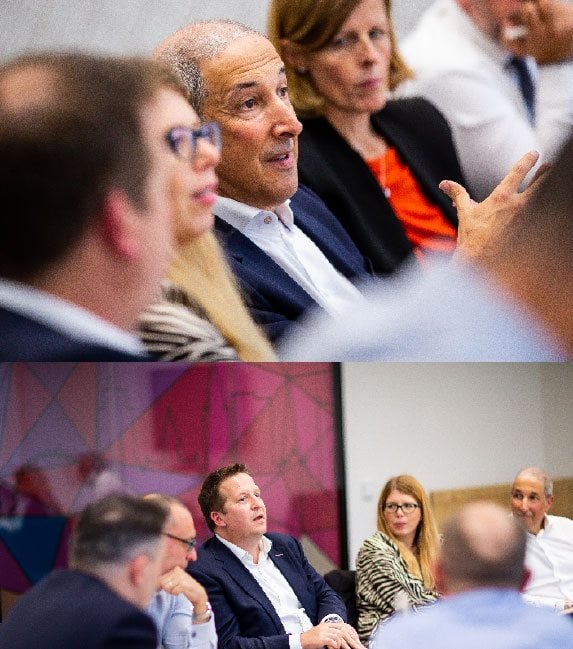Georgina Stanley (GS): How do you see the Manchester legal market right now? Where do you see opportunities for growth?
Ros Bever, Irwin Mitchell (RB): Manchester is a vibrant city – it is very busy. We are attracting work from outside of the region, and I think that’s a consequence of both the rates and the expertise that we have here. It’s really healthy that we’ve got new competitors coming in – it shows there’s investment in the city, and I think we’re really well placed because of our commuting connections and also because we have lots of pockets of affluent areas surrounding the city.
GS: Robert – what about from the perspective of an independent firm?
Robert Levy, Kuits (RL): We haven’t found that the increase in the number of law firms in Manchester has had an adverse effect on us. In many ways, we’ve found that the middle market has opened up as a result of the competition at the higher end. We’ve very firmly pinned our colours to the SME mast and we’re finding that there’s plenty to go at there.
I think the increased profile of Manchester – and the increase in the number of firms coming here – has meant that we are picking up business from outside of Manchester; London in particular; not because we’re cheaper, but because as a Manchester firm, when you show up in London, potential clients see you somewhat differently to how they used to. They’re not picking us so much on cost – in fact there are London firms offering lower rates than we do- but because Manchester suddenly has resonance.
GS: Is that something other people see?
Michael Clavell-Bate, Eversheds Sutherland (MCB): Yes – this is unquestionably the second legal centre in the country, and every firm will say that they are seeing growth year-on-year. Whether they’re independent, international, or national, there is a place for everyone here. The market for new entrants has been interesting and is an endorsement of opportunities in the North West. Freshfields’ arrival a few years ago was interesting. Of course, there are obvious differences in the cost base but they chose Manchester with wider opportunities in mind – I think they’ve been very smart in this regard.
GS: Does that concern anybody?
Niall Innes, Mills & Reeve (NI): I think the opposite actually. The fact people like that are coming is reinforcing the feeling that this is the second city and people take it seriously, so there’s opportunity. It’s giving credibility to the importance of the region, rather than concern. At the moment the pie is getting bigger and it’s very competitive, but there’s enough work around for everybody. There are a lot of reasons to be confident.
MCB: It is often said that the market is saturated in Manchester’s legal sector. But that fails to recognise that the legal sector here is not just servicing North West clients. Firms have aligned themselves by reference to different strategies. We have incredibly important clients here doing impressive high-end, strategic work but we’re doing work for clients outside Manchester too – national and international clients and work networked from our global business.
GS: What do people think about the accountants – how much of a threat do you think they now pose?
Peter Jackson, Hill Dickinson (PJ): We’ve all got to be realistic and accept that they are now competitors – in this city they’ve made well-known, credible hires. It’s a bit of a difficult position we find ourselves in, because many of us work with the accountants, with clients, so to consider them the enemy all of a sudden would be foolish on our part. But they are very well-run businesses. They recruit incredible people. We’d be foolish if we didn’t see them as proper new entrants to the marketplace.
Sam Mabon, Brabners (SM): There’s the obvious challenge around independence of auditors, but there is also the difficulty at the outset for accountants being able to offer a full service when they’re focused initially around specific complementary disciplines. This of course in time may change, but it requires a significant investment and I’m not at this stage convinced they want to provide the complete, full service offering.
GS: Have they made as much ground as you were expecting?
MCB: You have to recognise they are serious competitors. They’ve been trying to eat the food off our table for decades. There are regulatory challenges for them, and conflicts are a big issue, but the advantage for them, of course, is their deep pockets and willingness to invest and adapt. Law firms have many advantages but those embracing change, particularly around tech, alternative legal service provider models, and so on, are the firms that will face the threat from accountants head on and grow market share.
Mike O’Connor, Addleshaw Goddard (MOC): They’re here to stay – we collaborate with them around clients and sectors, and sometimes we’ll compete against them. I see it as part of a rich economy – I don’t see it as a threat, but we do see a greater degree of collaboration happening these days with other legal providers as well, so that will just be part of that.
PJ: We’re seeing them pitching against us for work that you wouldn’t necessarily expect them to want, such as work for SMEs. They’re just like any other competitor – they’re not all-powerful.
MCB: They do tend to be far better than us at cross-selling their services – they do it with brutal efficiency and we have a lot to learn from them. They also develop medium and long term strategies which law firms tend to avoid.
GS: Do you think there are going to be more firms coming into Manchester?
RL: If it’s acknowledged as the second city commercially, I don’t think firms will be able not to be here. I think major law firms will want to be in both London and Manchester.
GS: What impact are all of these new entrants having on the local recruitment market?
Suzanne Benson, Trower & Hamlins (SB): We have a large London base, but we’ve been in Manchester for 45 years. The new entrants have made it more of a challenge to differentiate yourselves from some of the other London firms who’ve come up here, but I always try to be as clear as I can to potential new recruits that our Manchester office is not a north-shoring base, as there is an issue from an applicant’s point of view about how attractive that is.
GS: So how do you differentiate yourself?
SB: We look at how we word our adverts, our communications, and our social media, to make sure we’re getting the right message out. We are an international firm with eight offices, four of which are throughout the UK. We want to get out the national message – that we work for big national clients and we work in an integrated national way – but at the same time make it clear to people who we see as potential future partners that they’re going to need their own client base and opportunities in the local market.
Virginia Clegg, DAC Beachcroft (VG): For those of us who operate in the regions, there’s a very important message about the quality of work and experience that our young lawyers can receive. That can be something to do with the size of the deals that we’re doing; whilst we might be doing very big deals, they can get a lot of experience with smaller deals rather than just be part of the big machine doing the very big job that’s housed in the South.
NI: There’s a lot to be said for the experience lawyers can get here, because there’s really good work with good clients and you see a lot of people who don’t want to be in London and will choose to be here. But you also see a lot of people who have done their time in London and have got connections here who are coming back. They’re getting a similar standard of work here; maybe with less noughts on it, but the quality of what they’re doing is really good and the life around here is, in my view, much better, and that’s a real draw. So it’s a difficult recruitment market, but there’s a lot to sell to people who are interested.
GS: With regards to the more junior end of the spectrum, are there particular challenges about recruiting in Manchester?
Rob Elvin, Squire Patton Boggs (RE): The competition has increased – It’s more difficult to recruit because there are more firms chasing the really good people. But the city has a lot more going for it than other cities – when you advertise for a decent job you’re getting candidates who are in Newcastle, Leeds, Liverpool, or Birmingham wanting to come and work here. Differentiation depends on your firm. At Squire Patton Boggs we’ve been lucky enough to rely upon an international element for some years – that does attract younger lawyers.
GS: What about if you don’t have that sort of thing to offer? Chris, how are you finding it at Slater Heelis?
Chris Bishop (CB), Slater Heelis: The great thing we’ve got in Manchester is that a lot of the bigger firms have got good lawyers who after a number of years maybe want something different. The larger firms are great businesses, but sometimes people look at a firms like ours with 150 people, where you can get to know everybody, and it appeals because it’s so personal; perhaps for people at a stage in life where they fear burnout, or they’ve got young families.
RL: People are opting into a different culture, and that works for everybody because the right people end up in the right firms.
GS: Talking about culture, how is agile working changing business? Do you think it will ultimately reduce the need for firms to maintain a network of offices across the North West?
MCB: Yes, it’s going to reduce the real estate requirement, without a doubt. The buzz word these days is ‘agile’. Our average occupation in Manchester on any given day is around 65-70%. That not just down flexible working/working from home but a work force that is much more mobile. The traditional working day enforced for all is no good for clients, our people or the environment and commercially, it is a broken model.
RE: Processing of work can be done wherever, including at home, but we often talk to partners about how the winning of work is rarely done from the kitchen. You’ve got to be out and about. That doesn’t necessarily mean you have to be in your office, but you don’t cross-sell much if you’re not with your colleagues talking about opportunities, and that’s where the challenge is, to make sure people are spending enough time in the office to keep collaboration at a level where it creates work. We’ve created a strategic group across different levels of the office. What we’re trying to do is get support functions like IT to work with lawyers and partners strategically. It’s about getting people together and encouraging more engagement; making people feel that they have a role to play in setting the strategy.
CB: Mental wellbeing is another concern around home working. If somebody’s at home, under pressure to perform, and they’re working on Sunday night, who’s going to tell them to switch off?
GS: So how do you make that balance work?
PJ: There’s an irony that flexible working sometimes requires more hands-on management than just having a simple policy of coming to work in the office in the morning and going home when you finish. What we’re doing now is we’re making things sacrosanct that were more flexible in the past.
MOC: We trialled flexible working in my team, and what we found was people like me were fine about it. It tends to work for people who’ve got young families but those people who don’t have children, who live in the city centre – and there are lots of them – they just want to work at their desk.
VC: To assume that working from home is something young lawyers aspire to do is wrong. They actually want to come to work simply because it gives them a working environment that’s acceptable to them. I don’t think resistance on the part of senior people to their teams working flexibly is an age thing either. Some of my younger, most tech-enabled partners want their teams in front of them.
RL: There are other challenges with regards to millennials – one is that I’m not sure that when they grow up they want to be us, and also, there are many more opportunities for them to do other things outside of the law. That’s a massive challenge for us because if the smartest and the brightest decide that the law isn’t for them, then we’ve all got a problem.
GS: Looking around the corner to what’s likely to happen post-Brexit, how well do you think the Manchester legal market is going to adapt?
PJ: Many clients are saying to us what’s stopping them doing business now is uncertainty, and once they have that degree of certainty back, and they know what the rules are in the game that they’re playing, then it’s back to business. If that’s the case, will we necessarily see any downturn? Should we not even be optimistic that changing in the rules is actually good for lawyers, at least in the short term? Regulatory changes often drive things our way – so if there’s positive impact, then I think Manchester’s well suited to deal with it.
MOC: The city is such a different place to that of ten or 15 years ago. It’s an international city on the world stage now, which attracts business opportunities that were not there before. With Brexit, I think there will be some transactions that will just be put back six or none months, but they’ll come back again.
MCB: There remains a serious risk of a no deal Brexit – that leaves us in precarious position with constant talk of a major recession in front of us. Firms conducting business in multiple jurisdictions, who are nimble and have a broad practice are likely to be more resilient than those dependant on single regions.
RB: the level of expertise that we’ve got here will insulate us to a certain extent because I think we will pick up work from London.
SB: I think undoubtedly there will be some sort of Brexit shock, but it could be less focused on Manchester than on London. I know some investors are looking more at Manchester and other northern cities as a more attractive location for investment and business opportunities, which is also testament to the recent level of growth across the region.
RE: You have to be realistic, but I’ve been here 22 years, and I’ve never dreamed of living anywhere else in the country, having spent half my life in the South East. It’s much more cosmopolitan, in my view it’s got much more get-go than other northern cities, and it’s got a proper international airport and two of the biggest football clubs in the world. We’ve got things here which make us feel confident and can keep you going through a recession.
Roundtable contributors
Niall Innes, Manchester head, Mills & Reeve
Rob Elvin, Manchester managing partner, Squire Patton Boggs
Chris Bishop, managing partner, Slater Heelis
Ros Bever, Manchester managing partner, Irwin Mitchell
Michael Clavell-Bate, Manchester senior partner, Eversheds Sutherland
Sam Mabon, Manchester corporate head, Brabners
Peter Jackson, CEO, Hill Dickinson
Mike O’Connor, Manchester head, Addleshaw Goddard
Virginia Clegg, senior partner, DAC Beachcroft
Suzanne Benson, Manchester managing partner, Trowers & Hamlins
Robert Levy, executive partner, Kuits












